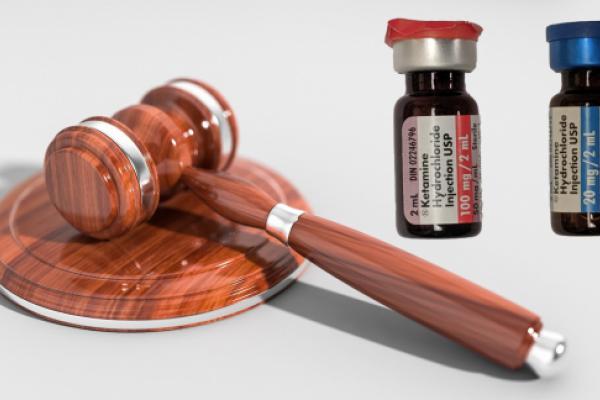Two states discuss psychedelic therapy for veterans with depression and PTSD in political committees
Psychedelic medicine is an issue increasingly visited by legislators, clinicians, researchers, patients, and advocates at the local, state, and federal levels.
This week, House committees in Missouri and Georgia heard testimony from various sources about the potential therapeutic effect of these substances for one of several subgroups of people commonly suffering from a mental health problem: veterans.
Missouri listens to doctors and psychedelic usersIn Missouri, the House Interim Committee on Veterans' Mental Health and Suicide chaired by Rep. Dave Griffith (D) heard testimony from a medical professional and people who have experience with psychedelics in a therapeutic treatment setting.
The meeting should be understood in the context of the new version to be introduced by Rep. Tony Lovasco of a bill allowing certain patients access to currently entheogenic drugs prohibited. Lovasco originally attempted to introduce the reform bill in March 2022, when the House Health and Mental Health Policy Committee addressed it and ultimately rejected it.
Among other provisions, the bill would address Missouri's current position on enforcing Right to Try (RTT) laws to include drugs from the Schedule I for people with serious medical conditions.
At the August 31 hearing, Rahul Kapur, a physician and head of a ketamine clinic treating people with severe depression (TRD), shared his insights into specific trauma veterans face. He said he felt the country had "an obligation to continue to explore and provide them with all resources" and to ensure that "psychedelics are a key resource in this fight".
Elaine Brewer, founder of the Humble Warrior Wellness Center and wife of a military member, spoke of the anxiety she felt while her husband was on duty, recalling stories of families losing loved ones in battle and how psychedelics completely changed the state of his mental health, allowing him access to the "gift of closure - a new perspective and a positive view of our future".
"This is single-handedly, in my opinion, from what I have seen, heard, and personally experienced, the single most effective treatment for post-traumatic stress, depression, suicidal ideation, treatment for the negative effects of traumatic brain injury, and yes, even drug and addiction treatment,” Brewer said.
This was the second of several meetings of the Committee before reporting its findings and recommendations to the legislature.
Georgia considers magic mushrooms for veterans with PTSDOn August 30, Georgia veterans actively supported the use of psilocybin for the treatment of post-traumatic stress disorder (PTSD) by presenting their testimony, as well as that of doctors practitioners on the House Defense and Veterans Affairs Committee. .
Ethan Whitfield and Marcus Capone went abroad to seek counseling and treatment for their PTSD with psilocybin after standard medication failed to help their severe depression. What they found were instant results after just one dose: "My negative thought patterns and self-destructive thought habits changed overnight," Whitfield said. "I'm discovering a new way to deal with the stress in my life. I still feel anger, sadness, anxiety [and] negativity. But they don't trap me."
Capone, who is a co-founder of the nonprofit organization

Psychedelic medicine is an issue increasingly visited by legislators, clinicians, researchers, patients, and advocates at the local, state, and federal levels.
This week, House committees in Missouri and Georgia heard testimony from various sources about the potential therapeutic effect of these substances for one of several subgroups of people commonly suffering from a mental health problem: veterans.
Missouri listens to doctors and psychedelic usersIn Missouri, the House Interim Committee on Veterans' Mental Health and Suicide chaired by Rep. Dave Griffith (D) heard testimony from a medical professional and people who have experience with psychedelics in a therapeutic treatment setting.
The meeting should be understood in the context of the new version to be introduced by Rep. Tony Lovasco of a bill allowing certain patients access to currently entheogenic drugs prohibited. Lovasco originally attempted to introduce the reform bill in March 2022, when the House Health and Mental Health Policy Committee addressed it and ultimately rejected it.
Among other provisions, the bill would address Missouri's current position on enforcing Right to Try (RTT) laws to include drugs from the Schedule I for people with serious medical conditions.
At the August 31 hearing, Rahul Kapur, a physician and head of a ketamine clinic treating people with severe depression (TRD), shared his insights into specific trauma veterans face. He said he felt the country had "an obligation to continue to explore and provide them with all resources" and to ensure that "psychedelics are a key resource in this fight".
Elaine Brewer, founder of the Humble Warrior Wellness Center and wife of a military member, spoke of the anxiety she felt while her husband was on duty, recalling stories of families losing loved ones in battle and how psychedelics completely changed the state of his mental health, allowing him access to the "gift of closure - a new perspective and a positive view of our future".
"This is single-handedly, in my opinion, from what I have seen, heard, and personally experienced, the single most effective treatment for post-traumatic stress, depression, suicidal ideation, treatment for the negative effects of traumatic brain injury, and yes, even drug and addiction treatment,” Brewer said.
This was the second of several meetings of the Committee before reporting its findings and recommendations to the legislature.
Georgia considers magic mushrooms for veterans with PTSDOn August 30, Georgia veterans actively supported the use of psilocybin for the treatment of post-traumatic stress disorder (PTSD) by presenting their testimony, as well as that of doctors practitioners on the House Defense and Veterans Affairs Committee. .
Ethan Whitfield and Marcus Capone went abroad to seek counseling and treatment for their PTSD with psilocybin after standard medication failed to help their severe depression. What they found were instant results after just one dose: "My negative thought patterns and self-destructive thought habits changed overnight," Whitfield said. "I'm discovering a new way to deal with the stress in my life. I still feel anger, sadness, anxiety [and] negativity. But they don't trap me."
Capone, who is a co-founder of the nonprofit organization
What's Your Reaction?















![Three of ID's top PR executives quit ad firm Powerhouse [EXCLUSIVE]](https://variety.com/wp-content/uploads/2023/02/ID-PR-Logo.jpg?#)







